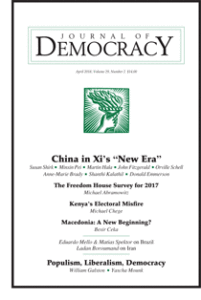 Slovakia has become the latest country in Eastern Europe to face a major political crisis. But while regional neighbors such as Poland and Hungary have been clashing with the EU over their perceived illiberalism, for Slovakia, the pressure on the government has come from the country’s own citizens, notes Nicolette M Makovicky, Lecturer in Russian and East European Studies at Oxford University:
Slovakia has become the latest country in Eastern Europe to face a major political crisis. But while regional neighbors such as Poland and Hungary have been clashing with the EU over their perceived illiberalism, for Slovakia, the pressure on the government has come from the country’s own citizens, notes Nicolette M Makovicky, Lecturer in Russian and East European Studies at Oxford University:
The tension has been such that the entire cabinet of prime minister Robert Fico had to resign in a single day….The story began when police discovered the bodies of Slovak journalist Ján Kuciak (left) and his fiancé, Martina Kušnírová, in their home in the village of Veľká Mača, about 60 km east of the capital, Bratislava. Both had died of gunshot wounds in what appeared to be a targeted assassination.
While the protests have been read by some as a recommitment to Western democratic values and a step away from the populism and “illiberal democracy” of neighbouring Poland and Hungary, it seems that for now, the revolution will have to wait, she writes for The Conversation.
 Populists often rail against elite malfeasance, but there are good reasons to think that many don’t care about corruption, Vox’s Sean Illing writes.
Populists often rail against elite malfeasance, but there are good reasons to think that many don’t care about corruption, Vox’s Sean Illing writes.
According to Princeton’s Jan-Werner Müller, author of What is Populism?, populists succeed by pushing a form of tribal politics that elevates an in-group (“the real people”) over an out-group (“the others”). As long as ethical breaches help the in-group, or are believed to do so, they simply won’t matter to committed supporters.
 Across the globe, populism and illiberalism are on the rise. What factors lie behind their ascent, and what does it mean for liberal democracies? the National Endowment for Democracy’s Journal of Democracy asks. In two articles from the Journal’s upcoming April issue now available in a special advance release, prominent commentators and political scientists William A. Galston and Yascha Mounk offer their insights.
Across the globe, populism and illiberalism are on the rise. What factors lie behind their ascent, and what does it mean for liberal democracies? the National Endowment for Democracy’s Journal of Democracy asks. In two articles from the Journal’s upcoming April issue now available in a special advance release, prominent commentators and political scientists William A. Galston and Yascha Mounk offer their insights.
On April 3, the National Endowment for Democracy’s International Forum for Democratic Studies will host a joint launch event for Galston’s Anti-Pluralism: The Populist Threat to Liberal Democracy (Yale University Press) and Mounk’s The People vs. Democracy: Why Our Freedom Is in Danger and How to Save It (Harvard University Press), both released in March 2018.
In “The Populist Challenge to Liberal Democracy,” Galston explores the social sources and political logic of populism, as well as ways in which liberal democracies can take advantage of their unique “power of self-correction” to respond. In “The Undemocratic Dilemma,” Mounk assesses how developed democratic states have grown increasingly unresponsive to voters; he argues that populism’s rise may in part reflect popular frustration with this “undemocratic liberalism.”







